Extra virgin olive oil in Tuscany and at Fattoria La Vialla
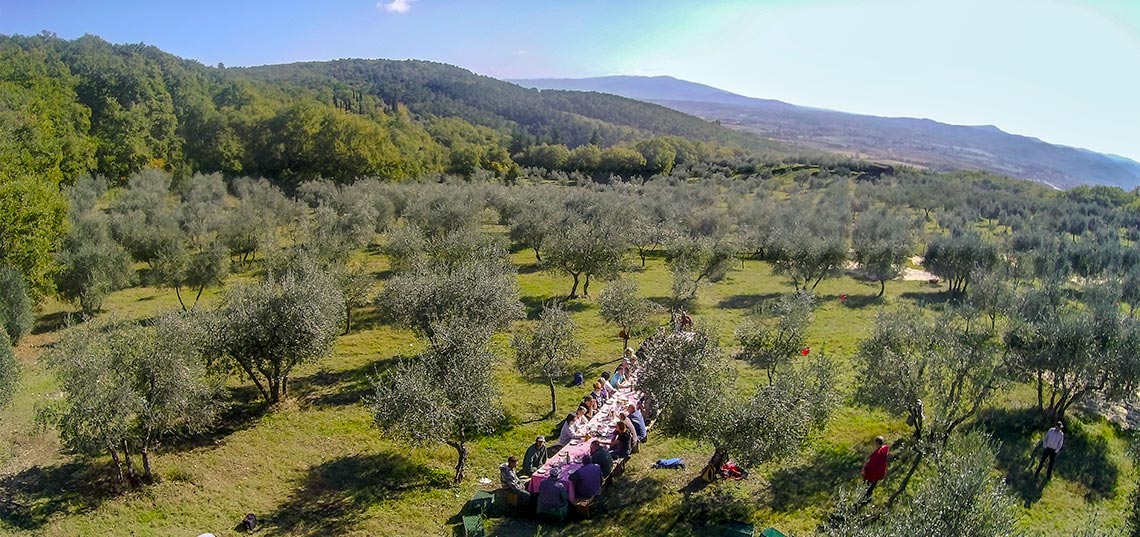 Lunch in Ca’ dell’Oro olive grove
Lunch in Ca’ dell’Oro olive grove
Dear friends, scroll down for the price list with details of each product. Below it you will find information on Fattoria La Vialla’s organic-biodynamic production methods.
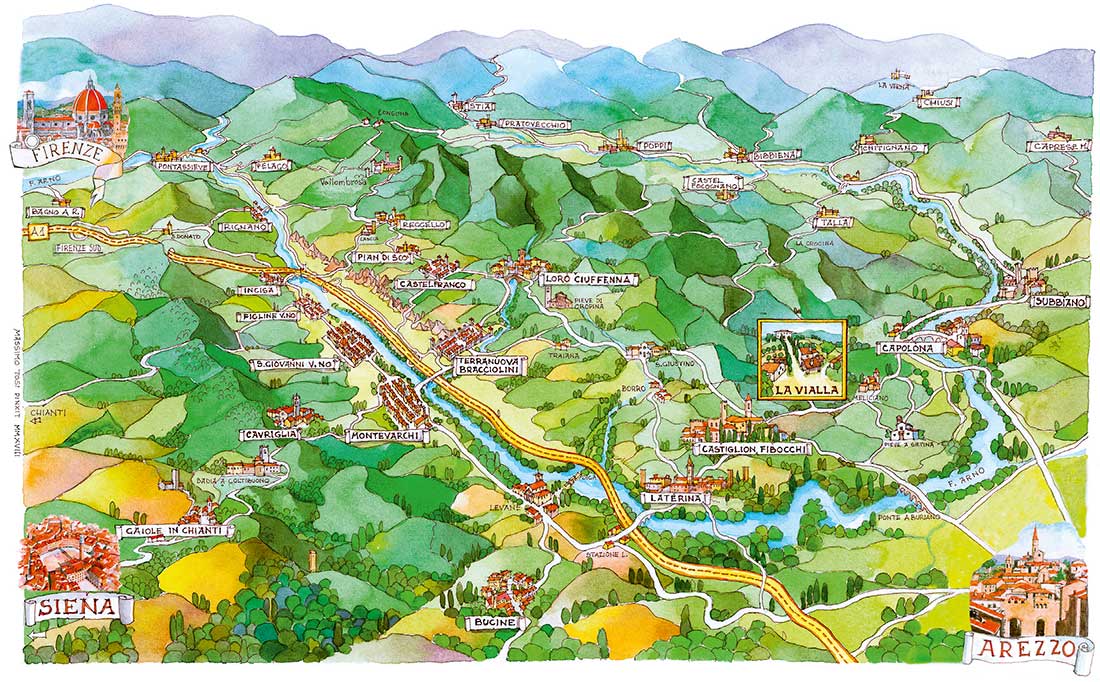 Upper Arno valley, between Arezzo and Reggello
Upper Arno valley, between Arezzo and Reggello
Tuscan extra virgin olive oil, among the most appreciated in Italy and worldwide, has been one of the focal points of food economy in Tuscany throughout the ages. Olive growing is very widespread, considering the roughly 93,000 hectares used for this purpose, 90% of which in hilly areas or low mountain slopes in the provinces of Florence, Siena, Arezzo e Grosseto. In 1716, a decree issued by Grand Duke Cosimo III de’Medici established the production area boundaries, acknowledging the superior quality and distinction of olive and wine production and becoming the precursor of the typical denominations of origin.
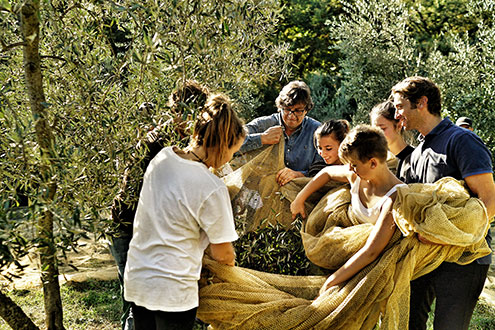 The Lo Franco Family during the harvest
The Lo Franco Family during the harvest
The 6 different varieties of olives that La Vialla grows in the province of Arezzo (and new olive groves elsewhere) are used to produce several types of extra virgin olive oil. The Tuscan one, “Olio Vialla”, has the most fruity and intense flavour. The “La Malva”, on the other hand, has a softer, rounder taste. (Two other oils, “l’Etruscòlo” and “la Murice”, are produced by farming friends who have “converted” to organic and biodynamic agriculture in collaboration with La Vialla and its Foundation.) Olive oil is a fundamental ingredient in the life of Fattoria La Vialla; it’s literally everywhere, as we will see later in “Extra virgin olive oil in the kitchen”. Descriptions of Fattoria La Vialla’s olive oils can be found on the individual product pages.
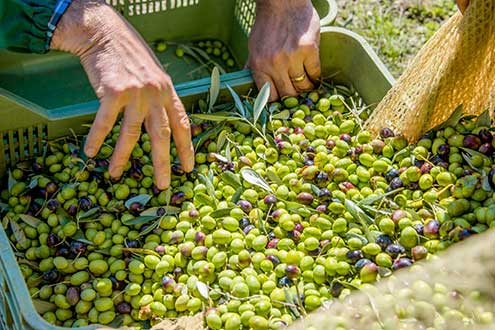 Freshly picked olives
Freshly picked olives
The definition of extra virgin olive oil
The definition of extra virgin olive oil, which many are unfamiliar with but is useful for non-experts in order to distinguish it from inferior categories (virgin, “lampante”), and also from other oils not from olives, is regulated by the European Union with Regulation no. 136/66/EEC, and Regulation no. EEC 2568/91. Extra virgin olive oil must be obtained through cold extraction and using solely mechanical methods. The acidity of extra virgin oil must never exceed 0.8%. When tasted, the fruitiness must be clearly recognisable as belonging to the fruit it comes from and, more generally, it must have a “green” sensation. It must not have sensory defects, such as rancid, fusty or winey. To produce one litre of extra virgin olive oil between 5 and 7 kg of fresh olives are required; the quantity varies according to the variety and how ripe they are.
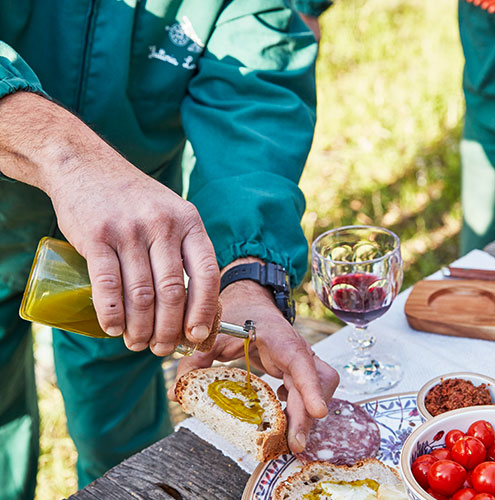 Tuscan bread and freshly pressed oil
Tuscan bread and freshly pressed oil
Olive growing at La Vialla – terroir, varieties, soil and biodiversity
At Fattoria La Vialla the extra virgin olive oil comes from trees that grow in ground located between 300 and 650 m.a.s.l., composed of Galestro, sandstone and clay, with Alberese limestone and sand, materials that are easily eroded, diversified and with various geological fronts. The organic and biodynamic cultivation of olive trees is inserted in a favourable context, on well-lit hillsides with excellent ventilation and natural drainage of rainwater, a temperate climate with a good difference in day and night-time temperatures. The alternation of woodland, cultivated fields, watercourses and hills forms the backdrop for a Renaissance landscape, cared for and shaped preserving biodiversity, using skilful methods and continuously improving the soil’s fertility, thanks to a closed, circular production cycle that reuses waste and the manure produced by the animals. The typical taste and goodness of olive oil from the Chianti area are, in part, given by the combined contribution of an age-old, skilful mix of olives, amongst which the main varieties used are: Morellino, Frantoio, Leccino and Raggiaio (or Correggiolo) – all native to Tuscany, and the most widespread and suitable for the climate.
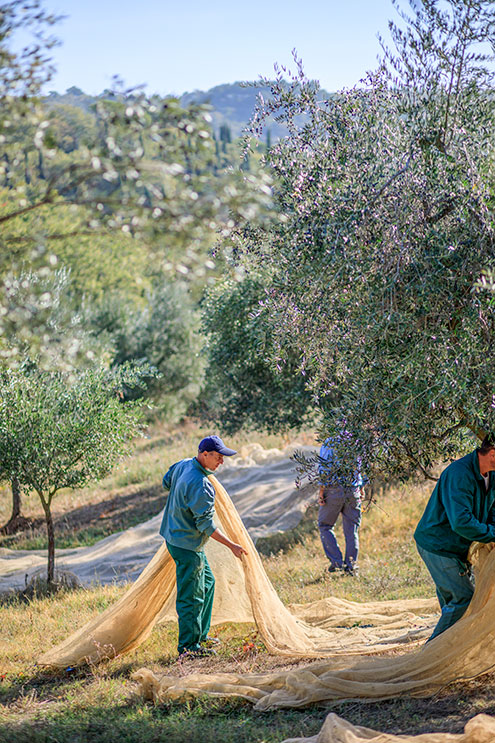 October, picking olives by hand
October, picking olives by hand
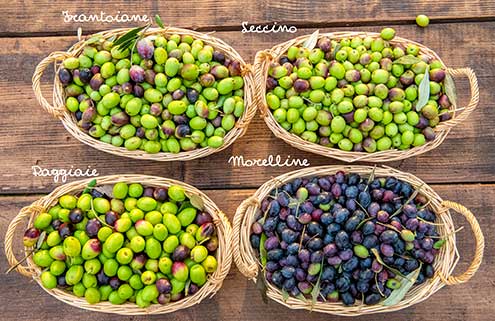 The four varieties of olives
The four varieties of olives
Morellino: dark coloured, they are the “basis” of Tuscan extra virgin olive oil, rather like Sangiovese grapes are for Chianti. The fruits are small, with a high yield of oil and excellent aromatic characteristics and phenolic intensity (bitterness).
Leccino: small fruits and excellent oil yield, they are known for their capacity to resist all kinds of adverse weather conditions. They also a fairly early variety, already reaching full ripeness in early November.
Frantoio: they have a characteristic, mixed colour, half green and half dark brown, and have spread almost everywhere thanks to their particularly fine aromatic qualities. They ripen later than the Leccino olives, between mid and late November.
Raggiaio (or Correggiolo): pale green in colour, they have a high yield of oil which is full-bodied and particularly aromatic.
Organic and biodynamic olive growing
The organic and biodynamic agricultural methods, endorsed and implemented by the Fattoria since 1983 (La Vialla was among the first farms in Italy to become a member of the AIAB, Association of Italian Organic Agriculture, nowadays the ICEA), forbid the use of pesticides, chemical fertilizers and GMOs (genetically modified organisms) and promote soil fertility through crop rotation, periodic rest periods for the land, and the choice of selected plants and seeds. The aim of biodynamic olive growing is to improve soil quality, increasing the organic matter in the ground year after year, in particular the quantity of humus, the more stable, useful, colloidal part of the soil. Underground life in the soil must also be increased and diversified.
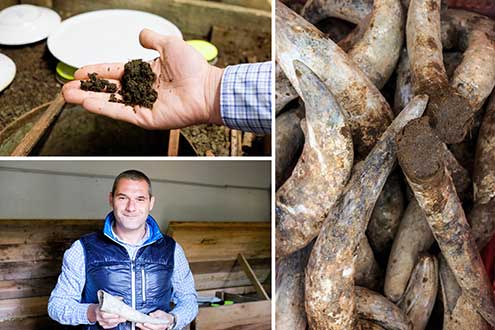 Donato Ciofini and the horn manure
Donato Ciofini and the horn manure
Biodynamics, based on the idea that the soil itself is a living organism made up of billions of precious microorganisms, foresees the use of mature compost and biodynamic preparations, all made with natural substances. It’s very similar to the good, meticulous agriculture of our forefathers. They used any possible natural remedy and resource to increase the fertility of the soil and health of the plants; the forerunner of biodynamic olive growing, which deserves credit for having safeguarded healthy fruits, without chemicals and waste, for thousands of years. Biodynamic olive oil, thanks to good cultivation and equally good production processes, stands out for its intense flavour, for the absence of chemical residues, for its vitality and its nutritional content. Biodynamic olive oil can have Demeter certification.
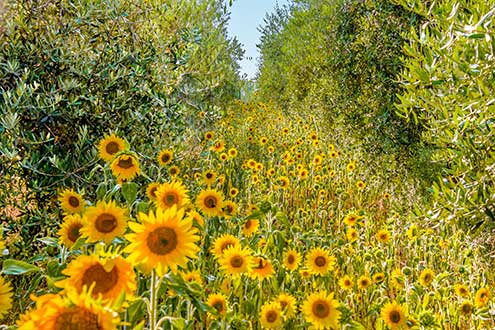 Sunflowers used as green manure in olive groves
Sunflowers used as green manure in olive groves
At the mill – from olives to oil
La Vialla’s extra virgin olive oil – an entirely natural product, cold pressed without the use of additives – is made from olives that are certified organic and biodynamic or, a small amount of them, from new olive groves that are undergoing conversion. In Tuscany olive harvest time is between November and December. In the past they used to wait as long as possible, in order to get the highest oil yield, seeing that milling was paid per kilo of olives. Today, paying great attention to quality, we begin picking as early as mid-October, choosing the earliest olive cultivars and then continuing with the others, in order. It’s a meticulous process, to use a metaphor “tailor made”, from selecting the olives, to tasting, to blending the various batches.
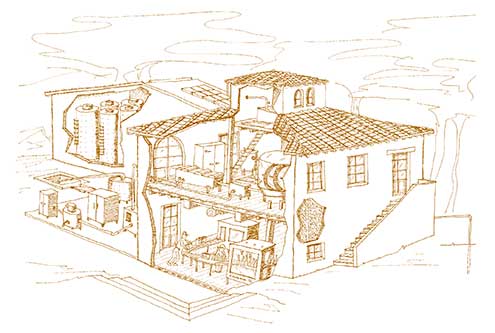 The climate neutral olive mill (click on the photo for details)
The climate neutral olive mill (click on the photo for details)
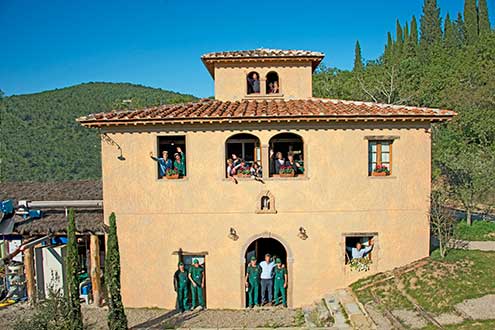 2013, the inauguration of the new mill
2013, the inauguration of the new mill
The olives, once picked, are first of all rinsed with a jet of water and then ground by the natural stone millstones, in a state-of-the-art mill that combines the knowledge of days gone by and future progress – thanks to the exceptional Carbon Free certification (with the highest classification, A+) obtained by La Vialla’s “new” mill, which was completed and inaugurated in 2013. The olives are milled using traditional natural millstones, inserted in a unique context: they’re enclosed in an airtight transparent dome filled with nitrogen (patented by La Vialla), which makes it possible to protect the extra virgin olive oil from oxidation.
 Salvatore tips olives between the millstones
Salvatore tips olives between the millstones
 Grinding in a protected atmosphere
Grinding in a protected atmosphere
This system gives two advantages: by using millstones the “juice” is not extracted from the olives by squashing them, but thanks to the action of the fragments of olive stones as they rub against the olive pulp. The role of the millstones is therefore that of breaking up the olive stones into pieces that are the right size, and mixing the resulting paste by turning slowly, for an overall time of 20 minutes, to then move on – still in a protected environment – to the malaxer, where it is mixed in order to facilitate aggregation of the drops of oil.
This is where the person in charge of La Vialla’s olive mill seeks the best balance between mixing time and the right temperature, according to the type and ripeness of the olives. In fact, the delicate natural action of lipoxygenases, which allows formation of the final aromas in the oil, is influenced by numerous external factors (quantity of water, temperature, external humidity, ripeness of the olives, content of polyphenols and fatty acids). And it’s up to the olive mill worker’s ability – rather like the oenologist in the winery – to find the best compromise between the various settings, adjusting the timing and temperature (which always remains below 27 °C). Finally, by means of cold centrifugation, the shiny, green liquid is separated from the olive paste (now called “pomace”) and the water contained in the olives.
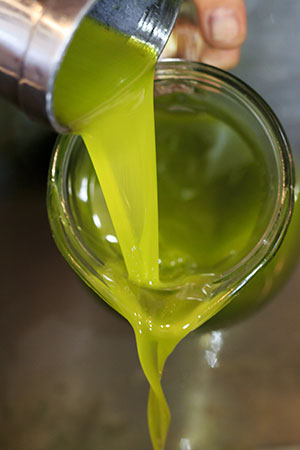 "Olio Novo" (= new oil)
"Olio Novo" (= new oil)
This is followed by a series of steps that are also important to preserve the characteristic of the oil, even though they may seem less so. From above the oil descends into the jars below, purely thanks to the force of gravity. Each batch is tasted and blended with others according to criteria of equilibrium and harmony. The oil then rests in stainless steel containers at a low temperature, 14-16 °C. It is put into glass bottles, when required, and stored in the dark (the bottles should be kept in the dark at home as well, in a cool dry place, until they’re used!).
None of the by-products get thrown away. As in the Fattoria’s other production processes, a closed cycle is used for the olive oil – so the pomace (= the paste remaining after the oil has been separated out) is taken to the compost heap and mixed with manure and other waste products, to be used later in the fields, and the waste water, with its precious content of soluble polyphenols, is used to produce a natural dietary supplement – which has a strong antioxidant capacity – that has been patented by La Vialla.
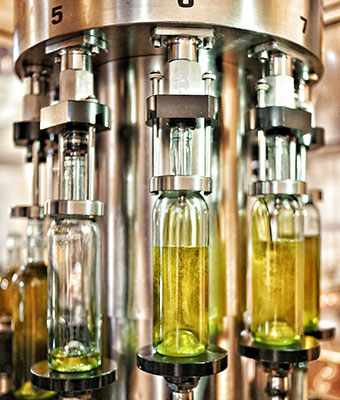 Bottling the Extra Virgin Olive Oil
Bottling the Extra Virgin Olive Oil
Extra virgin olive oil and health – olive oil and the Mediterranean diet
Entirely natural, like honey or freshly squeezed grape juice, a good extra virgin olive oil has and preserves a marked nutraceutical value (the term is a portmanteau, coined some years ago, of the words nutrition and pharmaceutical), on the borderline between the properties of a foodstuff and a medicine. Despite its high lipid content, 98% of the total, it is extremely stable and healthy, a unique natural preservative, the star of the Mediterranean diet (now recognised and promoted by UNESCO). In fact these are “good” fats – the majority unsaturated and with a balanced amount of essential polyunsaturated fatty acids. The small, remaining part – 1or 2% of the total amount – characterises the quality of extra virgin olive oil. It is made up of 220 secondary metabolites of the plant and its fruits; minor but extremely significant components. Particularly worthy of mention are the high content of vitamin E (tocopherol) and polyphenols. Some of which have an important therapeutic role, others are natural antioxidants, others again are decisive in characterising the oil’s aromatic qualities.
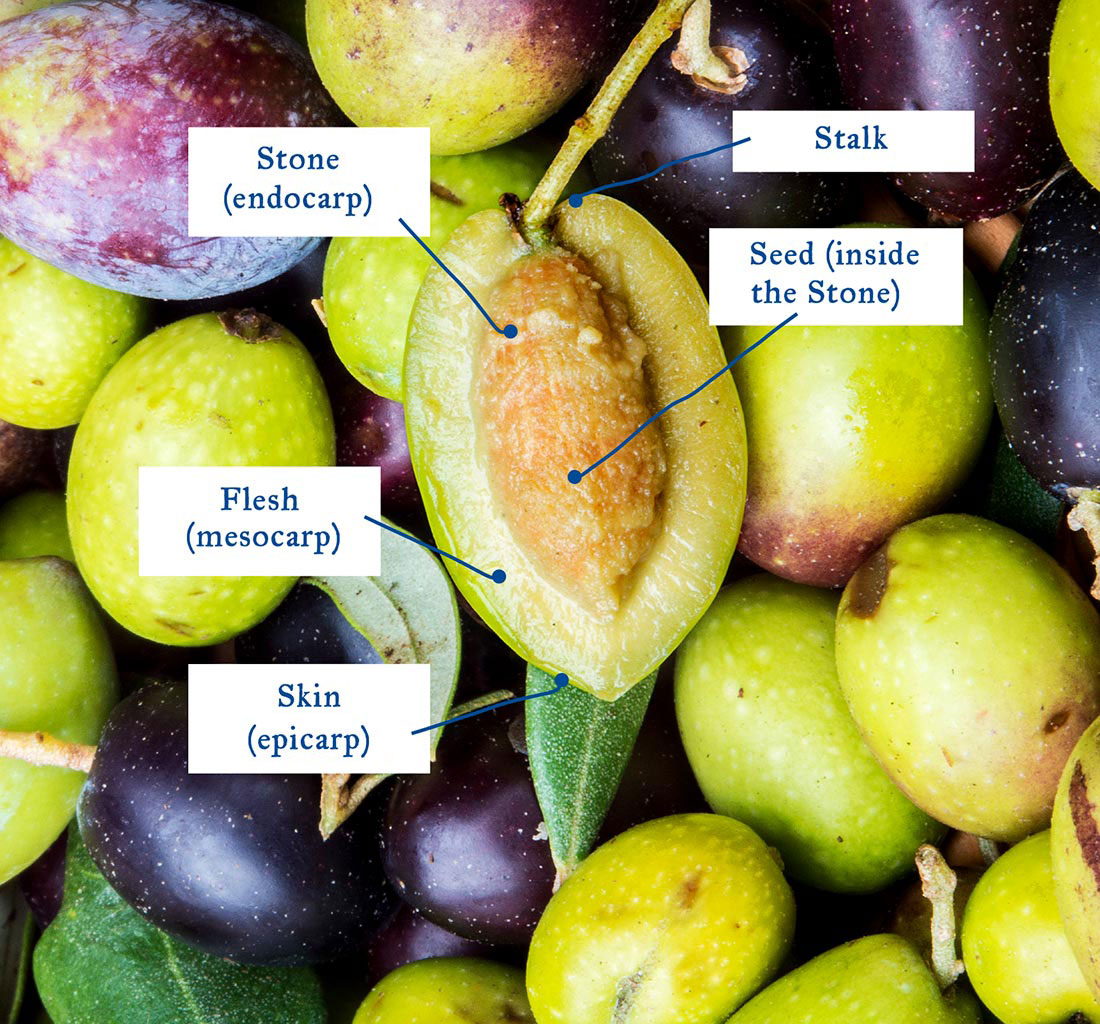 Cross section of an olive
Cross section of an olive
Polyphenols, stable molecules with a double bond and high molecular weight, are capable of maintaining the nutritional and biological characteristics of extra virgin olive oil whole, preserving the unsaturated fatty acids (linoleic and, in particular, oleic) from inevitable oxidative phenomena. They also play the same, valuable, antioxidant role in the human body. In fact polyphenols protect cells against degenerative phenomena, diseases generally caused by the excessive presence of free radicals in the body, caused by external factors (pollution, cigarettes, alcohol, etc.) and internal factors (genetic factors, ageing).
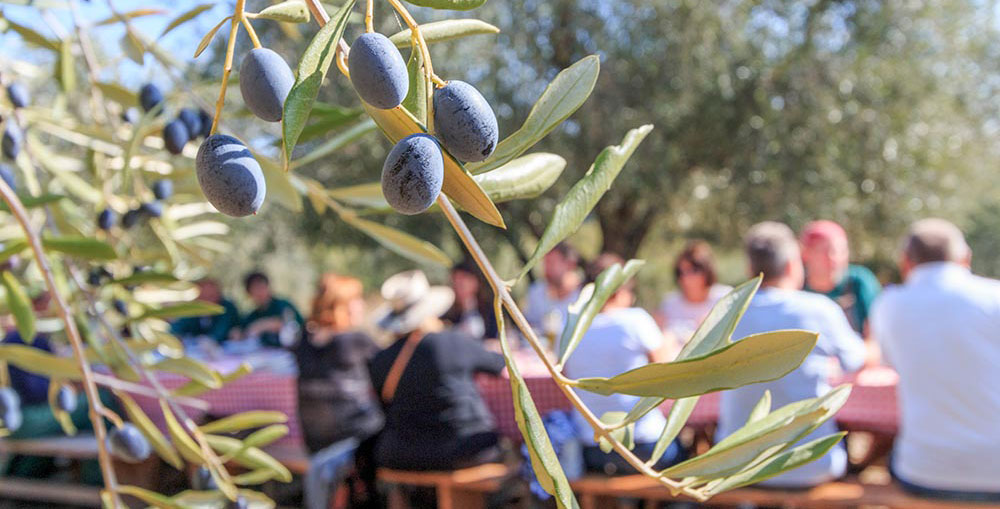 October – time to harvest, time to celebrate
October – time to harvest, time to celebrate
Polyphenols are organic molecular compounds; natural antioxidants found in plants. They all go to make up a family composed of over 5,000 different molecules, which play a protective role for plants and, as confirmed by numerous scientific studies, also for human beings. In extra virgin olive oil they are divided into 3 main groups: fat soluble polyphenols, tocopherols (vitamin E) and water soluble polyphenols. Extra virgin olive oil is a natural source of vitamin E. All characteristics that are permitted by EFSA (European Food Safety Authority) to be used on labels.
Extra virgin olive oil is effective for controlling the level of “bad” cholesterol (LDL), but that’s not all, the presence of oleic acid encourages an increase in the level of “good” cholesterol (HDL). Besides reducing the risk of cardiovascular disease in general, low levels of LDL promote good health of blood vessels.
The well-being of bones, on the other hand, is linked to the antioxidant properties and the fact that olive oil increases the level of osteocalcin, thanks to which the bone structure acquires greater resistance to traumas and osteoporosis.
Lastly, the presence of numerous natural antioxidants helps prevent typical conditions linked to senescence and degenerative diseases. For example, the presence of oleocanthal helps natural defence against diseases such as Alzheimer’s.
Extra virgin olive oil in the kitchen
In Tuscany olive oil is everywhere, it’s hard to find a recipe in which it isn’t among the ingredients (even in many desserts!). From Renaissance cuisine to the Mediterranean diet, it’s the “fil vert” that links small town gastronomic culture and the passing of generations. From the beloved spaghetti with tomato and basil, to vegetables in “pinzimonio”, bruschetta and ancient recipes such as Pappa al Pomodoro or Ribollita. And it’s just as important for Fattoria La Vialla’s jars of sauces. The oil used for cooking them must be of excellent quality.
The dressing for a seasonal Tuscan salad is simple: olive oil, salt, wine vinegar or balsamic vinegar and a pinch of pepper. The fresh, fruity aromas of the green liquid will give the dish an elegant touch. For preserves it’s important to use the best olive oil because it enhances the recipe and, at the same time, acts as a natural preservative. For frying, the majority of chefs now agree as well (in the kitchen at La Vialla for sure), the best choice is extra virgin olive oil. Last year’s is fine as well, if there’s any left. It’s better because it’s one of the oils with the highest “smoke point” and, consequently, produces less noxious substances, as well giving an excellent flavour.
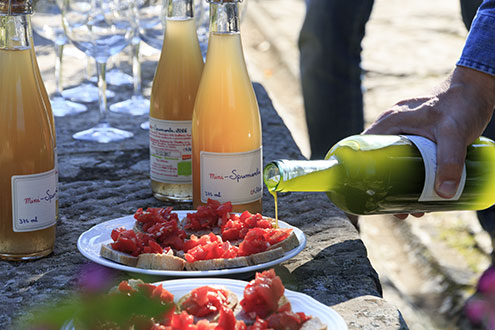 Tomato, bread and new oil – deliciously simple
Tomato, bread and new oil – deliciously simple
Awards and recognition for La Vialla’s extra virgin olive oil
In the course of its young career, La Vialla’s olive oil has won some of the most prestigious international awards. First and foremost, overall first place – among organic and non-organic oils – in the (top) intense fruit category at one of the historical international competitions with the most participants, the Ercole Olivario at Spoleto, where we also won a special prize as “Organic Olive Producer of the Year”.
Here is a list of the main awards received by our Vialla extra virgin olive oil:
- 5 times “Honourable Mention” at Vinitaly’s Sol, Verona
- 1st place at BIOL Toscana 2008, Florence
- 7 times “Grand Mention” at the Orciolo D’Oro, Pesaro
- 1st place in the intensely fruity category at the Ercole Olivario 2010
- 3rd place at the Zurich Olive Oil Award
- 4 times “Special Mention” at the Leone D’Oro, Lecce
- Twice among the “Top 25 best” at the BioPress World’s Best Olive Oil, Dusseldorf
- 2nd place at the Oro D’Italia 2014, Trieste
- Finalist at the Ercole Olivario 2018
- “Extra Gold” at the BIOL International Prize 2017 and 2019
- 3 Gold Medals (Quality, Quality Organic and High Polyphenols) at the Berlin Global Olive Oil Awards 2021
- 1 Platinum (Infused) and 4 Gold Medals (Infused, Quality, Organic and High Polyphenols) at the Berlin Global Olive Oil Awards 2022
- Gold Medal at the BIOL International Prize 2013, 2020 and 2022
The lines below, written by Gabriele D’Annunzio, mange to give an idea of the preciousness of this nectar, similar to the colour of the sun and gold, that with its fruity fragrance is capable of taking us on a mental journey back to our own childhood and that of mankind:
Olio con sapiente arte spremuto
Dal puro frutto degli annosi olivi,
Che cantan - pace! - in lor linguaggio muto
Degli umbri colli pei solenti clivi,
Chiaro assai più liquido cristallo,
Fragrante quale oriental unguento,
Puro come la fè che nel metallo, ,
Concavo t’arde sull’altar d’argento,
Le tue rare virtù non furo ignote
Alle mense d’Orazio e di Varrone
Che non sdegnàr cantarti in loro note...
(Gabriele D’Annunzio)
Oil with skilful art pressed
From the pure fruit of ancient olive trees,
Which sing - peace! -in their silent tongue
Of the undulated Umbrian hillsides,
Clear and much more liquid crystal,
Fragrant as an oriental unguent,
Pure as the faith that in concave
Metal burns on the silver altar,
Your rare virtues were not unknown
At the tables of Horace and Varro
Who did not disdain to sing your praises...
(Gabriele D’Annunzio)